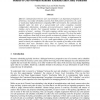Free Online Productivity Tools
i2Speak
i2Symbol
i2OCR
iTex2Img
iWeb2Print
iWeb2Shot
i2Type
iPdf2Split
iPdf2Merge
i2Bopomofo
i2Arabic
i2Style
i2Image
i2PDF
iLatex2Rtf
Sci2ools
IJHPCA
2006
2006
On the User - Scheduler Dialogue: Studies of User-Provided Runtime Estimates and Utility Functions
Effective communication between user and scheduler is an important prerequisite to achieving a successful scheduling outcome from both parties' perspectives. In a grid or stand-alone high-performance computing (HPC) environment, this communication typically takes the form of a user-provided job script containing essential configuration information, including processors/resources required, a requested runtime, and a priority. User requested runtimes are notoriously inaccurate as a predictor of actual runtimes. This study examines whether users can improve their runtime estimates if a tangible reward is provided for accuracy. We show that under these conditions, about half of users provide an improved estimate, but there is not a substantial improvement in the overall average accuracy. Priority, as implemented in many production schedulers, is a very crude approximation of the value users may attach to timely job completion. We show users are capable of providing richer utility fun...
Essential Configuration Information | IJHPCA 2006 | Overall Average Accuracy | Successful Scheduling Outcome |
| Added | 12 Dec 2010 |
| Updated | 12 Dec 2010 |
| Type | Journal |
| Year | 2006 |
| Where | IJHPCA |
| Authors | Cynthia Bailey Lee, Allan Snavely |
Comments (0)

